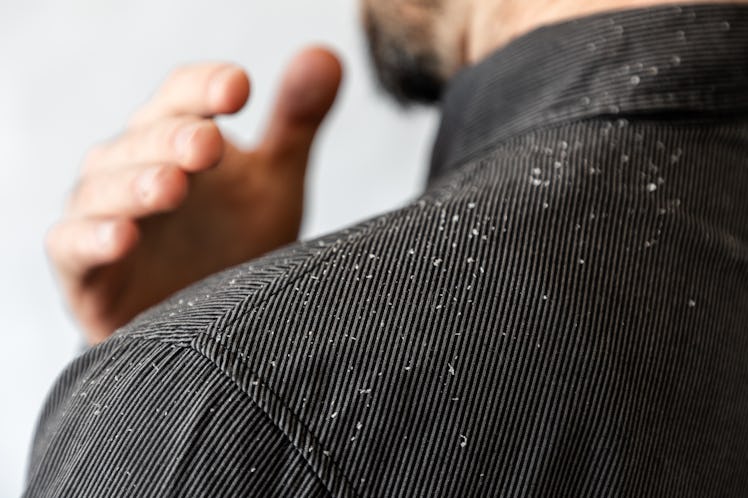How To Get Rid Of Dandruff, According To A Dermatologist
For the best chances at clearing dandruff, you may need more than one medicated shampoo.

You put so much effort into getting a great haircut, but then flaking from your scalp ruins the look. You’re not alone with this issue. Dandruff is actually common — about half of adults have it. And although dandruff is harmless, it can still be a total inconvenience. Not only is it unsightly, but it can also be incredibly itchy — and, yes, itching at it too much could lead to hair loss. But what causes dandruff in the first place?
Dandruff occurs when a person’s head has an excess of skin cell growth and death, which can be caused by anything from stress to a fungus to dermatitis. But thankfully, because dandruff is hard to miss, it’s also easy to diagnose, and there are many different ways to get rid of dandruff.
What Causes Dandruff?
“Dandruff is a very common condition, but the cause is unknown,” says dermatologist Peter Young, M.D., medical director of skincare company Facet. Still, “researchers have learned that several factors most likely work together to cause it.”
One potential cause is contact dermatitis, which occurs when your skin gets irritated because of something it’s been in contact with. Shampoos and other haircare products are common culprits.
Several studies have found a link between the yeast Malassezia and scalp health. Everybody has Malassezia on their heads, as it likes to munch on saturated fatty acids found in the oils on the scalp. Some skins, however, perceive this breakdown as something that shouldn’t be happening and end up producing more skin cells to renew the skin layers more quickly than normal, even up to every two to seven days — when the standard is roughly 30 days. These skin cells then cluster together and flake off, causing dandruff.
The cause can sometimes be seborrheic dermatitis, particularly if you’re experiencing a bad case of dandruff. Seborrheic dermatitis is a chronic type of eczema that manifests with dandruff, as well as red patches and greasy hair. It sometimes affects the neck and ears too.
It could also just be that you have very dry skin, or a dry skin condition. When dry skin causes dandruff though, it should be easy to spot, because the flakes aren’t as oily and might be a little smaller than flakes caused by other conditions. Cold, dry, or windy winters can, as a result, exacerbate this type of dandruff.
A weak immune system — because you have an immune system disorder, have undergone invasive therapies recently, or simply are very stressed — can also heighten dandruff. “Certain medical conditions can result in dandruff, such as Parkinson’s Disease and HIV,” Young adds.
“Dandruff is not caused by poor personal hygiene,” Young says. However, it can be worsened by certain hair care practices that dry out the scalp — including using a hair dryer on the hot setting and excessive use of strong hair care products, such as chemical relaxers and hair dyes, says Young.
Similarly, there is often the temptation to vigorously scrub the scalp and hair to remove the flakes and scales. But this can actually make dandruff worse by irritating the scalp, which can even lead to hair loss.
How To Get Rid Of Dandruff
“Although there is no cure yet for dandruff, several shampoo treatments are available, which can control the condition by removing the scale and reducing the redness and itching,” Young says.
First, try an over-the-counter dandruff shampoo, and use it regularly for several continuous weeks. Young suggests choosing shampoos with ingredients such as zinc pyrithione, an antibacterial and antifungal medication that can be found in Head and Shoulders; selenium sulfide, which is an antifungal that slows the death of skin cells and can be found in Selsun Blue; the antifungal ketoconazole, which can be found in Nizoral; and coal tar, an antibiotic that can be found in Neutrogena T-Gel.
“My favorite shampoos for dandruff are over-the-counter selenium sulfide and prescription strength ketoconazole 2%,” says Young. “It is often helpful to alternate or rotate these shampoos since the active ingredients work differently,” he adds.
For more severe or stubborn cases of dandruff, ask your primary care provider for prescription medication for your scalp. This may include prescription fluocinolone solution, which is low in strength, and augmented betamethasone lotion, which is high in strength, or topical corticosteroid lotion.
We may receive a portion of sales if you purchase a product through a link in this article.